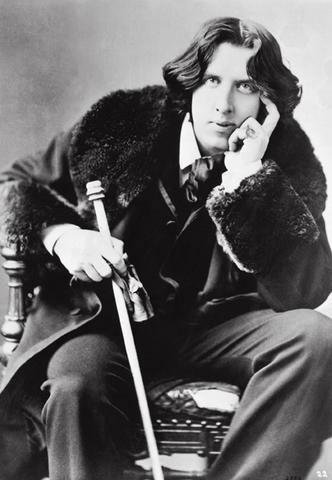
I have long admired Wilde for his writing and his fashion, so it made sense to pick up The Complete Works of Oscar Wilde for cheap.
This week I read his only novel, The Picture of Dorian Gray. It is a must-read for any person, as you will suddenly "get" all references made to Dorian Gray (look, I just came across one yesterday in my daily blog-reading), and you will quickly learn that Wilde writes in aphorisms. Seriously -- everything the guy puts down on paper is a punchy universal truth. You know someone is a master if they do something better than Shakespeare...
So, Dorian Gray... Glad I read it. Would I recommend it? Not necessarily. It was written in Victorian England, and definitely reflects the time period. All of the description gets boring (typical of the Gothic novel), and sometimes Wilde's wit is just exhausting. But, if you can get past those minor quibbles, please read it!
The protagonist is Dorian Gray, a fashionable, beautiful, rich young man whose friend, Basil Hallward, paints a magnificent portrait of him. Dorian wishes he could remain as gorgeous as that portrait forever... The novel follows his life primarily, including his near-marriage, his addiction, and his, umm, bad decisions...
Within pages of reading I scribbled a question on my bookmark—"is every line an aphorism?" (if it isn't a universal truth, it is still a witty epigram). The answer is "Not quite, but close." The character of Lord Henry is the greatest provider of these; he is like the best friend who influences you to smoke pot, drink cheap beer, or skip class. You know you will have a good time with him, but your other friends warn you to stay away... Here are just a few I underlined while reading:
- ...there is only one thing in the world worse than being talked about, and that is not being talked about (chapter 1).
- And Beauty is a form of genius—is higher, indeed, than Genius, as it needs no explanation (2).
- All influence is immoral... because to influence a person is to give him one's own soul (2).
- There is absolutely nothing in the world but youth! (2)
- To get back one's youth, one has merely to repeat one's follies (3).
- Nowadays people know the price of everything, and the value of nothing (4).
- Faithfulness is to the emotional life what consistency is to the life of the intellect—simply a confession of failures (4).
- Yes, we are overcharged for everything nowadays. I should fancy that the real tragedy of the poor is that they can afford nothing but self-denial (6).
And so these are some of the lessons imparted to impressionable, young and beautiful Dorian Gray. You know, this is why Lindsay Lohan had so many problems. She had too many people like Lord Henry around!
Part of the reason I decided to pick this novel up is because I'd lived by the preface alone (see my blog about blogging). I liked to pick it apart and admire the language, using it support any argument I had (most often with myself) about aesthetics. Wilde was inconsistent, as I explained in that ol' blog of mine. So am I. So is literature.
Is Dorian Gray didactic? Is it a rumination on our obsession with youth and beauty? Is it simply a well-written book? You know, I could expound on these and other questions for ages. But, I did that with my review of Do Androids Dream of Electric Sheep?, so I figure I'll give that a rest.
My recommendation:
Read this novel, especially if you are one of those people who likes to read "the classics." This one is considered a classic for good reasons:
Did you know "Dorian Gray had been poisoned by a book?" (chapter 11). Is this possible?
Why does art exist? Some say "it's an outlet" or "it's to show our true selves." Do you think a work of art can come alive? Or somehow retain the essence of its subject?
Oh, and be careful what you wish for. That is all.
Next up: The Hitchhiker's Guide to the Galaxy by Douglas Adams. (Let's see if I can handle a sci-fi book that makes fun of sci-fi).

1 comment:
Hello!
It's good to see your comments on The Picture of Dorian Gray.
I read the book too, and I have a few questions that I hope you can enlighten me.
Lord Henry sends Dorian a French book, and it says it poisons Dorian, but I don't understand how.
It seems that Dorian has changed a lot after reading the book, and then he becomes notorious in England, but I don't understand what exactly he's done that's sinful.
I must say that this book is interesting, but since my first language isn't English, it's kind of tough for me to fully understand it, especially when the language Wilde used looks a bit different from how people speak today.
I'd appreciate your help.
Post a Comment